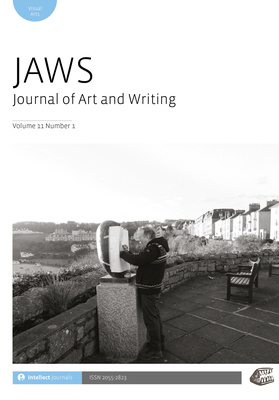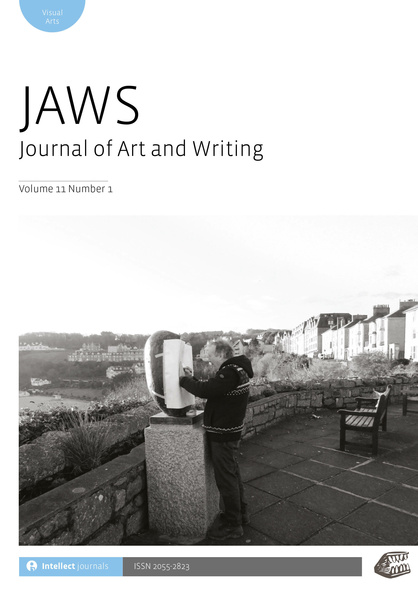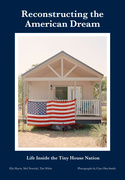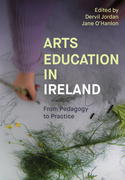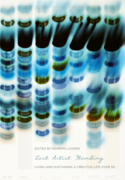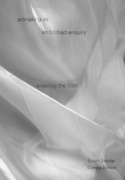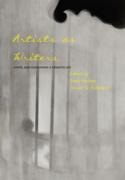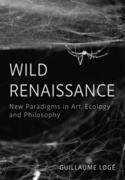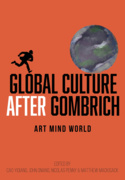JAWS: Journal of Art & Writing (Journal)
JAWS is a peer-reviewed journal that publishes new art and writing from early- to mid-career researchers and practitioners working across creative disciplines. JAWS publishes writing about art and writing as art. We welcome practice-based research, visual essays, book reviews and interviews by emergent practitioners and researchers. Supporting criticality and experimentation in arts writing, the journal connects authors to an international audience. JAWS welcomes divergent and/or unconventional forms, as well as more traditional submissions.
Formerly published as JAWS: Journal of Arts Writing by Students, 2015–2025 (ISSN: 2055-2823, Online ISSN: 2055-2831).
Editors-in-Chief
Alice Hill-Woods
University of Bristol, UK
editors.jawsjournal@gmail.com
Lizzie Lloyd
University of the West of England, UK
editors.jawsjournal@gmail.com
Associate Editors
Hatty Nestor
University of Reading, UK
k.h.a.nestor@reading.ac.uk
Ralph Overill
Glasgow School of Art, UK
ralphoverill@gmail.com
Rebecca Sibley
University of the Arts London – LCC, UK
rebeccasibley@googlemail.com
Sajad Sotoudeh
University of Bristol, UK
af23066@bristol.ac.uk
Lucy Sames
University of the West of England, UK and Falmouth School of Art, UK
lucy2.sames@uwe.ac.uk
Aims & Scope
JAWS: Journal of Art & Writing is an international, peer-reviewed journal that publishes new art and writing by researchers, practitioners and writers from a range of disciplines.
JAWS publishes writing about art and writing as art. We welcome original research articles, practice-based research, visual essays, book reviews and interviews. We encourage divergent and/or unconventional forms, as well as more traditional submissions. As it stands, we only accept submissions in the English language, but our aim is to connect international contributors with an international audience. We publish diverse critical and experimental submissions that are supported by rigorous, double-anonymized peer review, alongside diligent editorial processes. Our interdisciplinary editorial and advisory boards reflect these ambitions.
Scope
JAWS publishes articles, essays, critical reviews, interviews, and texts that perform and reflect on art and/or writing as both a discipline and a practice. Each issue builds around a theme or provocation, and contributions span a wide range of forms, including but not limited to:
-
Academic submissions up to 6000 words
-
Artistic Practice and/or Visual essays up to 5000 words / 12 images
-
Interviews up to 4000 words
-
Exhibition, book, event reviews between 1000 and 3000 words
-
Reflective pieces between 1000 and 3000 words
The journal also encourages submissions that challenge existing norms and push the boundaries of what constitutes art and writing.
Submissions
Peer Review Policy
All articles undergo initial editorial screening either by the journal's Editorial Team and/or incumbent Guest Editors. Articles then undergo a rigorous, anonymous, external peer review by two referees, following the guidance in Intellect's 'Peer review instructions'. Based on this feedback, the Editors will communicate a decision and revision suggestions to authors. To appeal an editorial decision, please contact the main Editor who will consider your case.
Ethical Guidelines
The journal follows the principles set out by the Committee on Publication Ethics (COPE). Read our Ethical Guidelines for more on the journal's standards.
Editors-in-Chief
Alice Hill-Woods
University of Bristol, UK
editors.jawsjournal@gmail.com
Lizzie Lloyd
University of the West of England, UK
editors.jawsjournal@gmail.com
Associate Editors
Hatty Nestor
University of Reading, UK
k.h.a.nestor@reading.ac.uk
Ralph Overill
Glasgow School of Art, UK
ralphoverill@gmail.com
Rebecca Sibley
University of the Arts London – LCC, UK
rebeccasibley@googlemail.com
Sajad Sotoudeh
University of Bristol, UK
af23066@bristol.ac.uk
Lucy Sames
University of the West of England, UK and Falmouth School of Art, UK
lucy2.sames@uwe.ac.uk
Editors-in-Chief
Alice Hill-Woods
University of Bristol, UK
editors.jawsjournal@gmail.com
Lizzie Lloyd
University of the West of England, UK
editors.jawsjournal@gmail.com
Associate Editors
Hatty Nestor
University of Reading, UK
k.h.a.nestor@reading.ac.uk
Ralph Overill
Glasgow School of Art, UK
ralphoverill@gmail.com
Rebecca Sibley
University of the Arts London – LCC, UK
rebeccasibley@googlemail.com
Sajad Sotoudeh
University of Bristol, UK
af23066@bristol.ac.uk
Lucy Sames
University of the West of England, UK and Falmouth School of Art, UK
lucy2.sames@uwe.ac.uk
Editors-in-Chief
Alice Hill-Woods
University of Bristol, UK
editors.jawsjournal@gmail.com
Lizzie Lloyd
University of the West of England, UK
editors.jawsjournal@gmail.com
Associate Editors
Hatty Nestor
University of Reading, UK
k.h.a.nestor@reading.ac.uk
Ralph Overill
Glasgow School of Art, UK
ralphoverill@gmail.com
Rebecca Sibley
University of the Arts London – LCC, UK
rebeccasibley@googlemail.com
Sajad Sotoudeh
University of Bristol, UK
af23066@bristol.ac.uk
Lucy Sames
University of the West of England, UK and Falmouth School of Art, UK
lucy2.sames@uwe.ac.uk
Call for Papers
JAWS 11.1: Bodies in Process
Face-to-face with the idea of process, we might think of praxis, or artistic process, as a practice of continuation and development, of adapting to a constant present. We might think of writers and artists adopting a specific process, or how their bodies accrue the residues of their practice. Process also gestures to layers and strata, and the act of building upon something solid in order to speculate something new. We might think of what is ‘unfinished’ or ‘incomplete’, but how this mediates how we read it. Process is dynamic and agile; process can afford mishaps in the pursuit of something that holds depth. We might think of annotations and strikethroughs, of birth and death and how something persists beyond its intended trajectory. We might think of pace and tempo; we might think of the present moment and how it is inextricable from the processes that led to it. Bodies both stage and are staged by various processes, governed by intra-actions and activities beneath what is immediately visible. In the mutable space of art/writing, we might contemplate such bodies in transition, their affects and effects and how these lead us back to making work that troubles closure.
For Volume 11.1, JAWS: Journal of Art & Writing invites work that contemplates bodies in process, whether that means material bodies doing the work of processing – absorption, digestion, excretion – or bodies of work between starting and finishing and everything in between. We welcome practice-based research, visual essays, book reviews and interviews by emergent practitioners and researchers, and we're particularly interested to receive academic submissions that respond to the theme (up to 6000 words). For academic submissions please submit a 300-word abstract by 31 March 2025. Please submit any completed submissions by 25 April 2025.
Submissions may relate in some way, but are not limited to:
Queer bodies
Metabolising
Digestion
Excretion
Collage
Death studies
Procedural writing/procedural poetry
Feminism
Autotheory
Crip Theory
Migrations
Motherhood
Queer theory
Memoir
Drafts and revisions
Preliminary drawings
Sketchbooks
Gestures
Movement
Intersectionality
Sovereignty
Editors-in-Chief
Alice Hill-Woods
University of Bristol, UK
editors.jawsjournal@gmail.com
Lizzie Lloyd
University of the West of England, UK
editors.jawsjournal@gmail.com
Associate Editors
Hatty Nestor
University of Reading, UK
k.h.a.nestor@reading.ac.uk
Ralph Overill
Glasgow School of Art, UK
ralphoverill@gmail.com
Rebecca Sibley
University of the Arts London – LCC, UK
rebeccasibley@googlemail.com
Sajad Sotoudeh
University of Bristol, UK
af23066@bristol.ac.uk
Lucy Sames
University of the West of England, UK and Falmouth School of Art, UK
lucy2.sames@uwe.ac.uk
Editorial Board
Clementine Butler-Gallie
Universität der Künste, Berlin, Germany
Michael Eden
University of Arts London, UK
Roy Claire Potter
Liverpool John Moores University, UK
Advisory Board
Emma Bolland
Independent Researcher
Emma Cocker
Nottingham School of Art and Design, UK
Eduardo Corte-Real
IADE-Universidade Europeia, Portugal
Maria Fusco
University of Dundee, UK
Amanda Hodgkinson
University of Suffolk, UK
Falk Hübner
Fontys Academy of the Arts, the Netherlands
Wiebke Leister
London College of Communication, University of the Arts London, UK
Jeremy Millar
Royal College of Art, UK
Juan Sádaba
University of the Basque Country, Spain
Craig Staff
University of Northampton, UK
Susannah Thompson
Glasgow School of Art, UK
Editors-in-Chief
Alice Hill-Woods
University of Bristol, UK
editors.jawsjournal@gmail.com
Lizzie Lloyd
University of the West of England, UK
editors.jawsjournal@gmail.com
Associate Editors
Hatty Nestor
University of Reading, UK
k.h.a.nestor@reading.ac.uk
Ralph Overill
Glasgow School of Art, UK
ralphoverill@gmail.com
Rebecca Sibley
University of the Arts London – LCC, UK
rebeccasibley@googlemail.com
Sajad Sotoudeh
University of Bristol, UK
af23066@bristol.ac.uk
Lucy Sames
University of the West of England, UK and Falmouth School of Art, UK
lucy2.sames@uwe.ac.uk
Editors-in-Chief
Alice Hill-Woods
University of Bristol, UK
editors.jawsjournal@gmail.com
Lizzie Lloyd
University of the West of England, UK
editors.jawsjournal@gmail.com
Associate Editors
Hatty Nestor
University of Reading, UK
k.h.a.nestor@reading.ac.uk
Ralph Overill
Glasgow School of Art, UK
ralphoverill@gmail.com
Rebecca Sibley
University of the Arts London – LCC, UK
rebeccasibley@googlemail.com
Sajad Sotoudeh
University of Bristol, UK
af23066@bristol.ac.uk
Lucy Sames
University of the West of England, UK and Falmouth School of Art, UK
lucy2.sames@uwe.ac.uk

